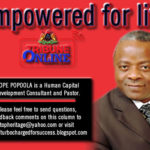STANZA 5 of the Nigerian National Anthem reads – “the labour of our heroes past, shall never be in vain.” The late Babatunde Jose (a former editor of the Daily Times), provided an insight into this topic in his article, titled – “The Independence Day Editorial”, published in the Daily Times on 1st October 1960, upon Nigeria’s attainment of independence. An extract of his article reads – “I am happy and I am sobbing. I remember Nigerians, who lived and died, during the fight for Nigeria’s independence. Men like Herbert Macaulay, Sir AdeyemoAlakija, Dr. J. C. Vaughan, Chief Bode Thomas, Alhaji Adelabu Adegoke, Mallam Saad Zungur, and many others. They were not destined to see the Promised Land. And at this moment, I remember the Nigerian youths, who were imprisoned, for daring to attack British rule in Nigeria. Men like Anthony Enahoro, Osita Agwuna, Mokwugo Okoye, Mallam Raji Abdallah, A. Y. S. Tinubu, Fred Anyiam, Oged Macaulay, Ikenna Nzimiro and many members of the outlawed Zikist Movement. And I remember youths like R. A. Fani-Kayode, N. A. B. Kotoye, Fred McEwen; all of whom voluntarily trooped to the Lagos Prison in protest against the official celebration of the Queen of England’s coronation in Nigeria.”
And I remember Nnamdi Azikiwe, when in the bitter struggle for independence, he once threatened Sir Hugh Foot (Chief Secretary to the British Government in Nigeria), that “The tree of liberty, shall be watered by the blood of tyrants.” And Chief Obafemi Awolowo, when he threatened Britain that – “We shall proclaim self-government and proceed to assert it.” Whilst on his sick bed, late Herbert Macaulay (“Nigeria’s Father of Nationalism”), incisively said “when the new nigeria comes, tell them that for their tomorrow, we gave our today.” He further added: “As my mustache and bow-tie are parallel and inseparable, so shall the unity between the North and South of Nigeria be indestructible.” He died on 7th of May 1946, few days after he made this heroic statement. In his inaugural address as Nigeria’s Governor-General, late Dr. NnamdiAzikiwe says – “during our protracted battles for independence, some of our heroes and heroines fell by the way side; some were incarcerated; some lost their jobs; some were victimized and made to suffer indignity. Therefore, we must jealously guard our freedom, with our lives, if need be.”
Chief Mbazulike Amechi, Hon. Minister for Transport and Aviation (1961-1964), who is presently the only surviving Minister of the First Republic, says: “It is not correct to say that Nigeria was granted independence by British on a platter of gold. We fought for our independence and won. The battle might not have been as bloody and intensive as that of Rhodesia (now, Zimbabwe), or Algeria, or Kenya, but we equally shed blood. Many youths and trade union leaders suffered unjust imprisonment, banishment and indignities.” On 27th October 1948, Osita Agwuna delivered a lecture titled “A Call For Revolution” at Tom Jones Hall, Lagos. Few days after, Osita, Habibu Raji Abdallah, Ralp Aniebode, Oged Macaulay, Fred Anyiam, Francis Jibuno, Ikenna Nzimiro, Bob Ogbuagu, Okei Achamba, S. O. Achara,Ogoegbunam Dafe and Tony Enahoro, who chaired the lecture, and others were arraigned on charges of uttering and publishing seditious words and materials. Soon after their apprehension, the lecture was bravely repeated with a mass rally at Glover Memorial Hall, Lagos on the 7th of November, 1948. As a result, more youths were arrested and jailed.
Upon their arrest, all the freedom fighters, collectively decided that none of them must plead for leniency in the court. Thus, affirming that neither imprisonment nor death could deter them from carrying on with the struggle, until freedom was won for Nigeria. Smart Obike Ebbi (“Marshall Kebby”) was the first to be jailed atthe Broad Street Prison, Lagos; earlier know as the “Queen’s Prison. The prison ground is now restructured and renamed “Freedom Park.” The prison was built in 1872. He was charged for publishing two articles on 1st and 6th of November 1948, captioned “Age of Positive Action” and “A Call For Action;”and sentenced on 10th of January 1949, to one year imprisonment on the two counts.
When Agwuna appeared before the court on 12th January 1949, he made the following heroic statement: “Your Britanic honour, it will be improper and wild justice for you to pass sentence on me. You have in a previous case against me, told me that you are not a representative of the Nigerian government, but an agent of the English Crown. I am aware however, that the Nigerian government is responsible for your salary. I have been charged for having committed sedition against the U.K. government, which has no authority over me, and which I do not recognise as my government. So, I am at a loss, to know whether you represent the British or the Nigerian government? Therefore, to say that I have been found guilty is ridiculous; and so, I make no plea before you. I suggest you defer sentence, because if you do not, you will not escape the wrath of the youths of Nigeria, which is sure to come. I am not prophesying. But what I have said is sure to come.”
When Fred Anyiam appeared before the court, he boldly confronted the judge, thus: “When we were fighting side by side with you against Hitler in the jungles of Burma, you kept telling us to ‘fight for world freedom.’ Now that I am fighting for the freedom of my own country, you term it sedition. Whether you send me to prison or order me to be hanged, cannot stop the march of Nigerian youths for freedom. If anybody will regret, it is you who have soiled your fingers with the blood of innocent youths and God will pronounce His own sentence on you.” Many traditional rulers, who boldly resisted colonial invasion in their domains also paid very heavily, as they were mercilessly humiliated, banished or killed by the British forces. Some Empires, Emirates and Kingdoms that were brutally crushed, were Lagos, Benin, Calabar, Opobo, Sokoto, Itsekiri, Kanen-Borno, Nupe, Kontagora, Nembe-Brass, Bida, Kano, Adamawa, Bauchi, Arochukwu, Keffi, Lapai, among others.
Following the revolutionary lecture and rally, which was held at Glover Memorial Hall, Ebute-Metta, Lagos, HabibuRaji Abdallah was arrested and charged to court, along with his compatriots; who were all very resolute in fighting the colonialists, towards the attainment of political independence for Nigeria.
Thereupon, HabibuRaji Abdallah, delivered a famous revolutionary speech at the Lagos High Court, where he was arraigned on 7th of November 1948, thus :-“This is an important day indeed. The most-important, perhaps in the history of our country. I call it the most-important because it is today that we have to decide, whether we are to be free or remain hereditary bondsmen, who knows not that they must be free?”
“I hate the Union Jack with all my heart. Because save in Britain, wherever it goes; far from uniting, it divides the people. I have nothing against King George VI of England. But I hate the Crown of Britain with all my heart, because to me and my countrymen, it is a symbol of oppression, a symbol of persecution and in short, a material manifestation of iniquity.We have passed the age of petition. We have passed the age of resolution. We have passed the age of diplomacy. This is the age of action. Plain, blunt and positive action. Therefore, I am here this evening, to call a spade a spade, an axe an axe, and a machete, a machete.”Today, I, HabibuRaji Abdallah, by the grace of God, President-General of the Zikist Movement and Field Secretary of the NCNC, do hereby, declare myself a free and independent citizen of Nigeria – “I owe no allegiance to any foreign Government, and in the absence of any “government of the people by the people and for the people of Nigeria”;I am henceforth, not bound to obey any law, other than the Nigerian Native Laws, Customs and International Laws. Therefore, I shall pay no more tax to this Government, because if you pay, they will use that money to perpetuate their domination over you.”
At the end of the day, Habibuand his compatriots, Anthony Enahoro, Fred Anyiam, Smart ObikeEbbi(“Marshall Kebby”) and OsitaAgwuna, were arrested, tried and sentenced to two years imprisonment for sedition. Upon his sentence, he reacted in mitigation to the presiding judge, Justice Gregg, thus :- “if you sincerely believe that it is a crime, to fight for freedom, then by all means, condemn me to death. Were I to be set free today, I cannot give assurance to muzzle my tongue. As for me, my conscience being clear, I shall be satisfied to leave the final verdict to God and His unfathomable river of time. So, proceed to fulfill the pleasure of those who put you here. I shall leave the final verdict to God.”
Before his trial and conviction, HabibuRaji Abdallah, who was a Senior Wireless Monitor in the Post & Telecommunications (P&T) had been dismissed from the Civil Service for attending a political meeting, contrary to the Government General Order. He had on August 8 1947, attended a conference of the Zikist Movement and delivered a talk, titled – “ZIKISM : AS A NORTHERNER SEES IT.” Thereafter, he was issued an official queryon January 17 1948, to explain why he should not be disciplined for attending the meeting. He was given 7 days to reply. Buthe bravely submitted his reply within 24 hours in these words : -“I did not take permission from either the Secretary of State or the Governor, before attending the rally and making that memorable speech, because by the passage of the Act of Emancipation in 1833, no man was to be made a slave within the British Empire.” If I had contravened the provision of General Order (40B), then, I contend that the Orderis a direct violation of the ideal, which the British Empire stood for; and its continuedexistence is a breach of faith with thousands of my fellow Africans, who died in the last war for that Empire and its ideals. Therefore, I believe in the righteousness of my cause and offer no apologies.”
Consequently, Raji Abdallah was summarily dismissed from the Civil Service, without any retirement benefits. Thereafter, he became the President-General of the Zikist Movement. At this point, it dawned on the Government that unless a drastic action was taken, the situation would get out of hand. Then, on 12th April 1950, the British officials promulgated an Order-in-Council, out rightly banning the Zikist Movement.
Some ‘first generation’freedom fighters and nationalists, who boldly dared the colonialists during the fierce struggle in Southern Nigeria, were James Johnson, J. K. Randle, Sapara Williams, John Payn Jackson, Felix OladipoSolanke, MojolaoluwaAgbebi, Stella Jane Thomas, OrisadipeObasa, OyinkanAbayomi, Charlotte Obasa, M.C.K. Ajuluchukwu, Kola Balogun, Ernest Ikoli, Eni Njoku, Louis Ojukwu,Adelakun Howells, Margaret Ekpo, EyoIta, OkoiArikpo, JajaNwachukwu, KarimuKotun, AlvanIkoku, OzumbaMbadiwe, Michael Imodu, Curtis Adeniyi-Jones, Akinola Maja, Eric Moore, KitoyiAjasa, Israel OludotunRansome-Kuti, S. G. Ikoku, FunmilayoRansome-Kuti, Margret Ekpo, HabibuRaji Abdallah, OjikeMbonu, Sam Shonibare, Ayo Adebanjo, NdukaEze, OsitaAgwuna, among others.
Other dogged freedom fighters, in Northern Nigeria were the likes of Ibrahim Imam, Yusuf Hadejia, BabbaDan’agundi, Bello Ijumu, Abba Maikwaru, AbdulrahmanBida, Aminu Kano, MaitamaSule, TankoYakasai, J. S. Tarka, Isaac Kpum, GamboSawaba, M. D. Yusuf, MagajiDambatta, Abba Habib, Ali Konte, Yusuf Dantsoho,AbubakarZukogi, AbdulrahmanHoweidy, MudiSipikin, DalhaDankasaTela, LawanDambazau, MustaphaDambatta, HamisuHitla, Sabo BakinZuwo, Ibrahim Heebah, ShehuDantata, Uba Na-Alkassim, BashariGezawa, Sani Darma, ShehuSatatima, BaballiyaManaja, GarbaBida, Abubakar Tambuwal, GirinyaLokoja, Sa’aduJega, Moses Rwang, Jonah Assadugu, among others. To aid their cause,a resistant freedom fighting organization, called the Positive Action Wing (PAW), was formed under the umbrella of the Northern Elements Progressive Union (NEPU) in Kano,as a platform for mass mobilization and joint action. The structure and strategic operations of this group was very similar to the “Mau-Mau”, which was the Kenyan freedom fighting organization that fiercely fought for the independence of Kenya.
On the roll-call of “Nigeria’s heroes past” were patriots, who lost their lives in the Akassa (Ijaw) raid of 1895, Satiru Rising/Burmi War (Sokoto0 of 1903, Ijemo (Abeokuta) Massacre of 1914, Adubi War (Abeokuta) of 1918, Aba Women’s Riot of 1929, Labour Demonstration (Lagos) of 1941, King’s College (Lagos) Protest of 1944, Egba (Abeokuta) Women’s Tax Riot of 1948 and the Enugu Coal Miners Massacre of 1949, among others. All these liberation struggles triggered political and nationalistic revolution for Nigeria’s independence in 1960. So far, only some notable Nigerian leaders have been officially declared as “National Heroes” by the Federal Government. They include Herbert Macaulay, Sir Abuabakar Tafawa Balewa, Dr. NnamdiAzikiwe, Chief Obafemi Awolowo, Sir Ahmadu Bello, AlvanIkoku and Gen. Murtala Ramat Mohammed. Thus, their portraits adorn the Nigerian currencies. Late Chief M.K.O Abiola has also been added to the list, following the declaration of June 12, as Nigeria’s Democracy Day (in his honour).
Between 1914 and 1960, Nigeria maintained a colonial ‘imposed’ anthem – “God Save The Queen.” At independence, Nigeria’s anthem changed to – “Nigeria, We Hail Thee…” It was written by Miss Lillian Jean Williams and the music was composed by Frances Berda (both Britons). The current National Anthem – “Arise O Compatriots…” was adopted on the 1st of October, 1978; being the first anthem to be composed by Nigerians. Among those who participated in the composition of the National Anthem in 1977 was Tunde Ogunnaike (later, a Professor/Dean, Engineering Dept., Delaware University, USA), who died recently. Other contributors were Benedict Elide Odiase, Laz Ekweme (now a Professor), Akin Euba, EmeEtimAkpan, SotaOmoigui, P. O. Aderibigbe and John Ilechukwu.
To drive home the essence and depth of stanza 5 of the Nigerian National Anthem, which inspired this article, I hereby wish to use this medium to passionately appeal to the Federal, as well as the 36 States Government, to immortalize “Nigeria’s Unsung Heroes”; most of them are mentioned in this write-up (Parts 1 and 2); who peradventure, have not been given proper recognition till today. Societal role models and patriots needs to be encouraged and properly celebrated, for Nigeria to attain an impactful socio-political change, sustainable development and progress.
The labour of our heroes past, shall never be in vain…
- Comrade Abdullahi, a veteran youth activist, writes in via abdullahiganiyu751@gmail.com
ALSO READ FROM NIGERIAN TRIBUNE
WATCH TOP VIDEOS FROM NIGERIAN TRIBUNE TV
- Let’s Talk About SELF-AWARENESS
- Is Your Confidence Mistaken for Pride? Let’s talk about it
- Is Etiquette About Perfection…Or Just Not Being Rude?
- Top Psychologist Reveal 3 Signs You’re Struggling With Imposter Syndrome
- Do You Pick Up Work-Related Calls at Midnight or Never? Let’s Talk About Boundaries






